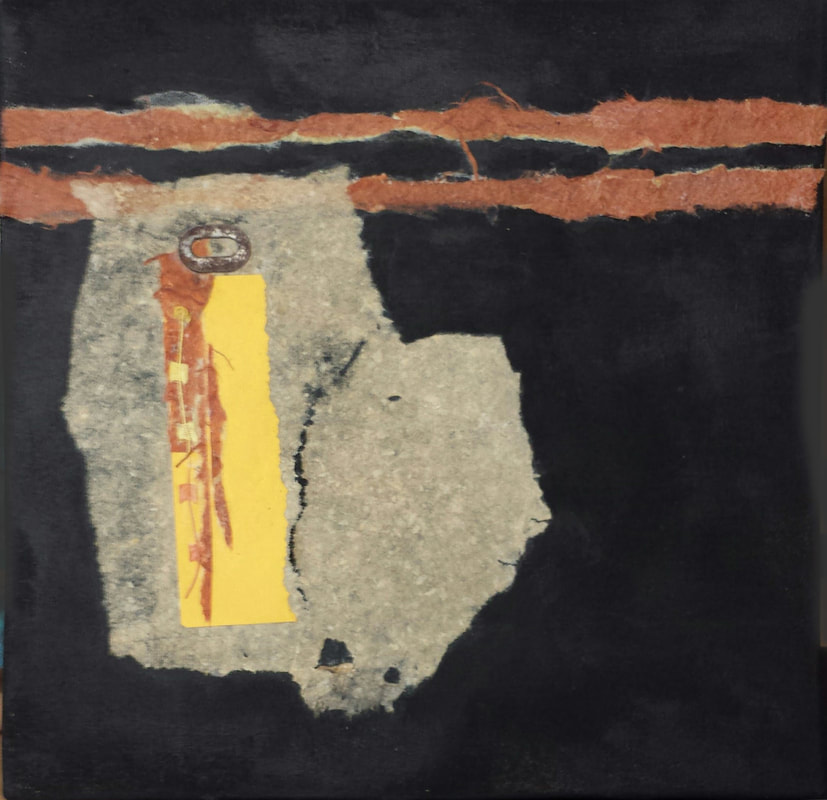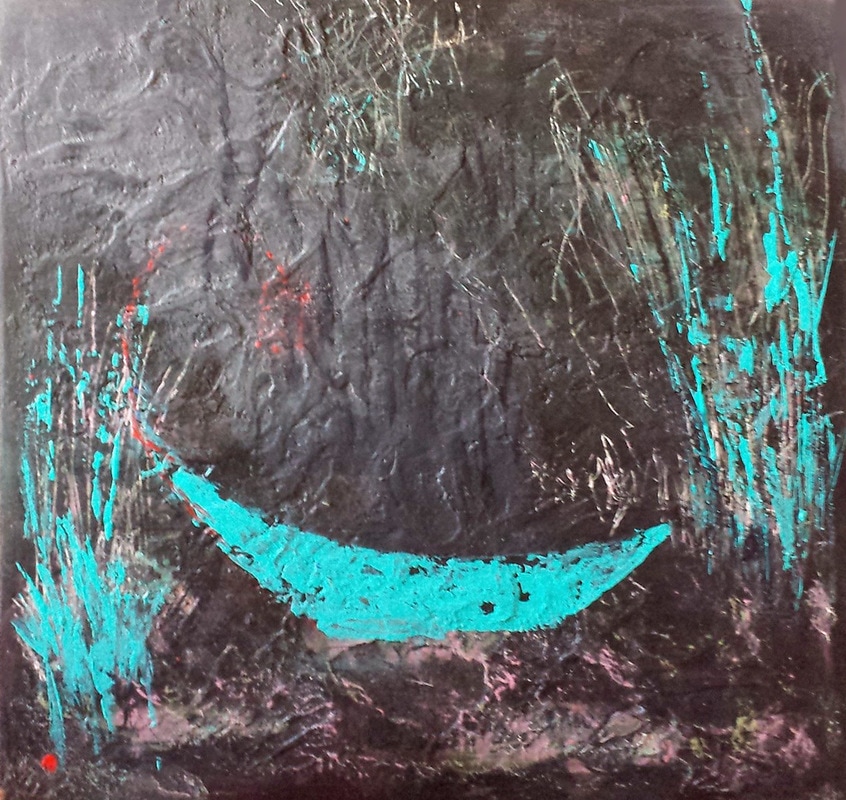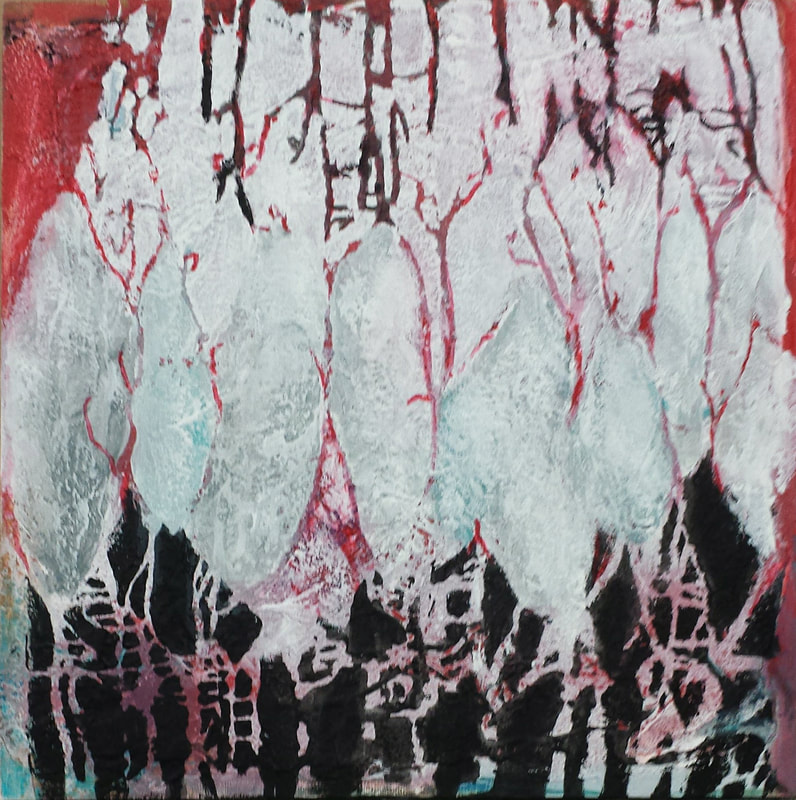
“Witnesses” by Kathy O’Meara
A cloudy week can beat four sunny ones black and blue. Following a solid August for Vi, five miserable days in September fuck her up.
On Monday and Tuesday, she wakes with crust coating her eyelids and a phlegmy cough.
She breaks two plates in the restaurant kitchen after hours on Wednesday (Ronnie almost slips on the mess while preparing grape leaves, but he cleans it after she sinks to the floor, crying).
On Thursday, she receives a call from her father, ignores it, and smokes two more joints than usual.
She pulls a muscle in her arm on Friday morning carrying a heavy load of groceries up the stairs.
But salvation arrives in the form of a phone call from Ronnie on Friday night. Her left arm dangles off the edge of her bed, aching fingertips stretched to the floor. He invites her to help him with his grandma’s party the next day. The forecast predicts clear skies.
“You been trippin’ the past few days, Vi. Come eat with us.”
“Will she have salad?”
“Yeah. And watermelon, grilled chicken, potato salad. Other good things. You need some real food; you been on that depression diet forever.” He sounds sober and sincere, so she accepts.
In the morning, her arm surprisingly supple, Vi opens her door when Ronnie knocks. She closes it behind her before he can step in.
“For real? I got like three joints rolled up,” he says. “And we haven’t smoked all week.”
“Speak for yourself. I have.” He frowns, but she continues. “And no, Ronnie. We’re going over your grandma’s.” He sighs and lags behind her.
In his sedan, they head to the suburbs on the edge of town. Dense foliage borders the roadway. Sunlight splinters through the leaves. A hawk circles overhead. The sky is very blue. Vi rolls down the window and sticks out her head. The roadway smells of raw musk. Ronnie taps his fingers against the steering wheel to a rap song, shooting her quick glances.
“You got some pollen on your cheek,” he says at a stop sign. He reaches to brush it off, but she tenses up.
“I got it,” she says.
They pull into his grandma’s cobblestone driveway and hop out the sedan. Ronnie snaps his fingers. “Remind me to fill up when we leave. There’s a station around the corner.”
“Need gas money?”
“Nah. Don’t start with me. I just wanted you to be alright today. Alright?” He bops her lightly under the chin and smirks. They walk up the pathway and his knuckles rap against the door.
Faint little creaks, a twitchy knob, then the sudden slap of air conditioning. A brown lady with soft wrinkles stands smiling in the passageway, wearing a loose top and matching pants with house shoes. Her fingernails are painted ivory. She eyes Vi.
“Well, you’re pretty.” She hugs them both with fleshy arms. “Come in, babies.”
The home is crowded with houseplants: hanging, sitting. Blooming and breathing. As they pass through the living room, a loud pink hibiscus petal falls from its bud. Vi bends to pick it up, sticking it in her pocket.
“Stop stealing,” Ronnie teases with a whisper. Vi rolls her eyes, but gives him a little grin. He smiles in return. Ronnie’s grandma scoots ahead, leading them to the kitchen.
“I’m Ms. Shirley. Now,” the kitchen smells of the labor of love, “you must be Violet.”
“Yes ma’am. But I go by Vi.”
“Last name, Vi?”
“Greene.”
“Very interesting.” Ms. Shirley points down the hall. “I keep violets in the spare room. Violets and lavender. I learned about color theory in one of my evening classes at the library.” She chuckles. “And they go with the theme. I think I’m doing pretty good.”
Ronnie gets a mischievous glint in his eyes. “Doing well.”
“Boy, shut up!” Ms. Shirley laughs. “One thing you can count on from me, Vi,” Ms. Shirley says, strolling behind the kitchen island, “I don’t cut this young man any slack. No overbearing grandmotherly love here.” She eyes them both, eyes darting back and forth, and grins. “Don’t let him mess with you.”
“Oh believe me, Ma’am. I don’t.”
“Yeah,” Ronnie mumbles. “Vi doesn’t let me do anything.”
As promised, there’s a large bowl of watermelon topped with sprigs of mint sitting on the granite island. Ms. Shirley turns to the cabinets and pulls out small dishes. She scoops the fruit onto the plates and passes them to Vi and Ronnie.
“There’s macaroni in the oven; potato salad, an actual salad, and marinated chicken in the fridge; and red beans and rice on the stove. A sweet potato pie’s on the way.” Ms. Shirley smacks her lips together after crunching into a chunk of melon. “Ronnie told me you all work together, so I know you know he cooks, too. But I just didn’t care to have the help today. Though, if you all could do these dishes, I’d appreciate it.” She gestures to the crowded sink, where pots and pans are stacked in a balancing act.
“Of course.” Vi pops a watermelon cube in her mouth and strolls to the sink. She begins placing the kitchenware on the counter. Ronnie leans in and squeezes her shoulder. She jumps.
“Woah, my bad. It’s me, friend; you’re in good hands.” She turns to look at him. He’s smiling, yet again. “I have to talk to my Grandma real quick. I’ll be back in like, two minutes. Grandma!” Ronnie turns around and hugs Ms. Shirley around her firm shoulders. “Let’s step outside for a little bit.”
“OK. Grab the chicken.”
They walk out to the back porch, Ronnie lugging the aluminum tray of barbeque to the grill. Vi starts the hot water. Her fingers jerk away at the searing heat.
“Shit.” She nudges the cold faucet to cool down the water and squints through the window. Ronnie is giving Ms. Shirley a loving pat on the back. She pinches a stray leaf from his hair and flicks it away. They mouth an exchange as the wind blows, gently lifting their shirts at the hems. Ms. Shirley turns quickly toward the window, and Vi thinks she sees her staring, so she starts cleaning a soapy plate.
Ronnie heads back in slowly and slides the porch door shut. “Just asked her who’s going to be here.”
“And?”
“A few older people from around the neighborhood. And her ‘boyfriend.’ Haven’t met him,yet. Some old guy, stays a few miles away. Told her that I’d have to approve.”
Vi runs water over a cast iron skillet and raises her pitch. “Boy, shut up!”
“That impression was shit.”
“Boy, shut up!”
“Better.”
They scrub and dry. They let some dishes sit out on the rack. They are quiet. Outside, Ms. Shirley maneuvers the grill soundlessly.
The sun sinks lower in the sky, not as inviting as earlier. When they finish, they step back. Ronnie drains the sink. Vi looks out the window and breathes.
“I need some air,” she says.
“Want to take a walk?”
“Doesn’t she need help?”
“Nah. Didn’t you hear her earlier?”
“Well, check in and make sure.”
Ronnie knocks on the screen door from the inside. Ms. Shirley looks up. He lays his still damp hand on Vi’s shoulder and jabs his thumb toward the door. Ms. Shirley’s eyebrows go up. Vi rolls her eyes and slides open the door.
“I’m sorry, Ma’am. We just wanted to go on a walk, I don’t know why he’s being so cryptic. You good?”
“I’m good, baby. I appreciate it.” A cloud passes overhead, and Ms. Shirley frowns.
“You all should hurry up. Looks like there might be rain after all.”
“Yes, ma’am. Won’t be too long.”
When they get to the front, they meet a straight-backed, mahogany man in a plaid button down. His shaky grip hangs onto the bottom of a large bouquet of orange lilies.
“Shirley here?”
“Yes, sir. You Mr. Barron?”
“Barron Baxter. That’s me.”
“Huh,” Ronnie grunts. Vi nudges him in the rib. She butts in and clears her throat.
“She’s out back. Do you know your way?”
“Sure do. You, young man. You her grandson? Ronald?”
“Ronnie. Yes, sir.”
“And you, young lady?”
“I’m Vi.”
“Vi?”
“Violet, sir.”
“Huh.” Mr. Barron shrugs. “You all be good, now. Headed out?”
“Just for a walk.”
“Well, then. You all be good, now.” He slinks around to the back. His slow stride reminds Vi of Ronnie’s.
They shiver at the sudden temperature drop as they troop up the street.
“He’s too old for me to talk shit about, Vi, so save it.”
“Damn, who said I was going to say anything? You’re always accusing me of something.”
“I said it because I know you. And anyway, all I would’ve said—”
“And yet, here you are about to say it.”
“All I would’ve said is, he said ‘You all be good, now’ twice. And his name is corny, but whatever.”
“Maybe he really wanted us to be good, Ronnie.”
“He just seems lame. Grandma can do better. You know I’m always looking out for my own.”
Vi rolls her eyes. “At the end of the day, you don’t own her. I thought you were the optimist out of the two of us.”
“I’m the realist. The realest, too.”
“Uh huh. You’re corny.” The road begins to slant uphill. “If you’re so real, what am I?”
“I don’t know.” He stops and squints toward the end of the road. “I’m waiting for the day you figure that out. I hope it’s something good.”
They pass houses with dull aluminum awnings, and porch rockers accumulating outside grime. Wind chimes clang in tune with the tiny, noisy birds zipping from tree to tree.
The yard of a periwinkle ranch house buzzes with bees. They speed by each other, some even venturing out to the curb where Vi and Ronnie trek.
“Woah!” Ronnie plants his sneakers into the concrete, but leans back to avoid three bees too close to his unblemished face. Vi studies him for a moment.
“You’ve got a little dimple by your chin,” she comments.
“For real?” Ronnie swats and smiles. There’s a twinkle in his eye. Vi doesn’t answer as the bees zoom around her. She ignores it all and turns away.
“Want to play a game?” Vi asks.
“Yeah, of course. What is it?”
“‘Who Lives Here?’ Something I just made up now. So you have to guess the kind of people who live here.”
“But I already know who lives here.”
“That’s the point. Tell me if I’m right or wrong. And if I’m wrong, you win that round.”
“Sure. Let’s go.”
“OK.” Vi gives the house a once over, hands on her hips. “People don’t live here. Just a person. A widow. Her husband died not too long ago—like, the past two years. She has gray hair, like an old cotton ball.”
“Damn, an old cotton ball?”
“I don’t mean it in a bad way. That’s just her. She was probably pretty in a librarian sort of way, once.”
“I don’t know about all that.”
“But you do know who lives here.”
“Yeah.”
“So tell me!”
“OK, you done?”
“Yes.”
“Damn, OK. OK. So you’re right. Except her husband’s still alive. He has a bad back, though. They’re actually coming to eat. She’s always giving my grandma pounds of topsoil and shit.”
“So then I wasn’t right! The dead husband was the main thing. Take your point; my gift to you.”
“Whatever you say. You know,” he adds, “I’m going to win, right?”
“Why? Because I’m bad at predicting?”
“No. And you won’t get better until you stop saying that. Just an observation. But no,” he continues, “it’s because I could just be lying to you about who lives in these houses, Vi.”
“You wouldn’t do that.”
“Why? Because I’m honest?”
“Actually, yes. That’s alright, though.” She turns to the house behind them. “You’re the only person I seem to be able to read.” Ronnie frowns.
There’s still no rain after half an hour. Ms. Shirley’s house is out of view, and they find themselves on another block. A high hanging mist begins to fog the sky. They continue to walk. The score is 6-2, Ronnie.
“We can’t play the game here, Vi.”
“Why?”
“Because I don’t know anyone this far. This is getting close to where that Barron guy lives. I won, let’s go back.”
“Leave that old man alone!” Vi pokes him. “Don’t be jealous because he has a girl and you don’t.” Ronnie grunts, but she continues. “And you saying ‘I won’ all carefree like that makes me want to win.”
“Well, glad to see you’re back to your old, competitive-ass self. You can’t, though. We ran out of homes.”
“Houses.”
“Yeah, whatever. Homes, houses.”
“No.” Vi stops. “Just because it’s a house doesn’t make it a home.”
He looks her over, creasing his eyebrows. “When’s the last time you talked to your people?”
“Spoke to my mom like two weeks ago. My dad called the other day. I’ll call him back.”
“When?”
“Tonight. I swear.” She smiles, small. “Today has been nice, I guess. I can do it.”
“You guess?”
“I guess. You and your grandma … you all are cute. It was a lot to handle.”
Ronnie sighs. “Just know that I tried. What about your sister?”
She shakes her head. “Don’t ruin it. I don’t want to talk to her.”
Ronnie holds his hands up in protest. “Alright. She fucked you over. They all did, I get it. Baby steps.”
They resume the game.
“Alright. Look at that house, the two-story with the balcony. Let’s both guess who lives there. And then,” Ronnie shuffles over to a curb, still a distance away from the impressive house in the cul de sac, “we’ll wait till someone comes out.” He squats at the curb and watches.
“Until someone comes out? You’re so extra.”
“Nah; someone has to come out. It was trash day, and they didn’t collect their cans yet.” The empty containers straddle the lawn, lids off.
“Alright. I’m taking you up on this.” She scoots beside him. She feels around for the hibiscus petal, peeking at the healthy pink before putting it back. “You first. Who you got?”
“A family of five. They have a dog. It’s a big dog.” Ronnie pulls a Bic out of his pants pocket and flicks it on and off, thinking. “The son’s the middle child, an athlete. Two daughters. The oldest is probably fine as fuck—she’s in college. The youngest is popular, finishing up middle school. And the parents are tracking their 401K as we speak.”
“They white?”
“Yeah.”
“No.” Vi shakes her head. “No, they’re not.” She tips her head to the side. It lands on Ronnie’s shoulder. She feels his muscles relax. “Or they would’ve picked up their trash cans already.”
After a breath, he says, “You right.”
“But they’re good people. I can feel it.”
They sit. The sun sinks. They remain the only two on the street. Ronnie doesn’t want Ms. Shirley to worry, so they concede, the residents of the house unsolved. Vi’s neck, strained from leaning against Ronnie, begins to throb. The rain starts to fall in droplets, and Ronnie wipes one off of Vi’s face with a gentle hand.
This time, she lets him.
Christiana Dillard is a freelance writer from Orlando, Florida who relocated to Pittsburgh, Pennsylvania. She has published non-fiction work with the Pittsburgh Black Media Federation, Pitt Magazine, and Soul Pitt Quarterly, a community magazine. She enjoys creating content and taking walks, no matter the weather.



























